#CivicTech
Explore tagged Tumblr posts
Text
How AI is Changing India's Lok Sabha Elections: A New Era of Voting
In recent years, artificial intelligence (AI) has started to play an important role in many areas, including politics. In India, AI is changing how people vote in the Lok Sabha elections. This change is making voting easier and helping political parties connect with voters.
What is AI in Elections?
AI means using computer systems to do tasks that usually need human intelligence, like understanding language and making decisions. In elections, AI helps analyze large amounts of data quickly, which helps political parties understand what voters want.
How AI is Changing Voting
Reaching Voters: Political parties use AI to connect with voters better. By looking at social media and online behavior, they can find out who to target with their messages. This allows them to send personalized information that is more likely to interest different groups.
Predicting Results: AI can guess the results of elections by analyzing data from past elections and current trends. This helps parties plan their strategies better, focusing on places where they are likely to win.
Engaging Voters: AI-powered chatbots and virtual helpers are used to answer voters’ questions about how to vote. These tools provide quick information, making it easier for people to understand the voting process.
Improving Security: AI can help make elections safer. By watching social media for fake news, AI can alert authorities to problems that might disrupt voting.
Challenges to Consider
While AI has many benefits, it also has challenges. There are worries about privacy, as AI collects personal data. There is also a risk of spreading false information quickly online. It is important for the government and organizations to create rules to ensure AI is used safely during elections.
Conclusion
The rise of AI in Lok Sabha elections is changing how people vote in India. By improving how parties reach out to voters, engage them, and secure elections, AI can make the voting process better. However, it is crucial to address the challenges that come with this technology. As India embraces these changes, it can lead to a more informed and engaged group of voters, shaping the future of democracy in the country.
#ArtificialIntelligence#AIinElections#LokSabhaElections#IndiaVotes#Election2024#VoterEngagement#PoliticalTechnology#Democracy#FutureOfVoting#DigitalIndia#SmartVoting#DataDrivenPolitics#ElectionSecurity#CivicTech#VoterAwareness
1 note
·
View note
Text
In the interests of streamlining my many projects, I now track new civic features over on a Civic Tech Field Guide category instead of this separate Tumblr.
0 notes
Quote
これまでにもCrowdStrike由来の問題は多数報告されており、2024年4月には、研究組織のCivicTech labのDebian Linuxサーバーがすべて同時にクラッシュし、起動を拒否するという障害が発生しました。これは、CrowdStrikeの更新が、特定のLinux設定がサポートされている最新安定版Debianと互換性がなかったのが原因だということが後に発覚しています。CivicTech Labでは、CrowdStrikeを削除するとマシンが起動できることを発見し、事態の対処にあたりました。 また、Rocky Linux 9.4にアップグレードしたユーザーからも「カーネルのバグによりサーバーがクラッシュする」という問題が報告されています。この問題に対しCrowdStrikeは「テストが不十分で、異なるオペレーティングシステム間の互換性の問題に対する注意が不十分でした」と主張しています。
CrowdStrikeによるPC起動不能問題は過去にLinuxディストリビューションでも発生していた - GIGAZINE
0 notes
Text
11/29(水) 第25回
今日は逃げ地図DX班が応募したCode for Japan主催のCivictech Challenge Cup U-22のスタッフの方に、zoomにてコンテストのフィードバックをしていただきました。
今回良かった点と改善点について評価側からの意見を教えていただきました。Google my mapでの制作には制限があるので、来年以降は違う形式で引き続き逃げ地図のDX化を進めていきたいと考えています。
今日は11月最後のプロジェクトでした。最終発表まで残り2週間弱あるので、発表練習や報告書作成などに取り組んでいきます。
0 notes
Text
Week 20: Learn& Test& Build& Repeat
Nov 4-8, 2019
Monday
The team was a bit slow to reconvene on Monday after a weekend together at CANUX. We did a NextGENTravel team-wide retrospective on last week’s Design Sprint.
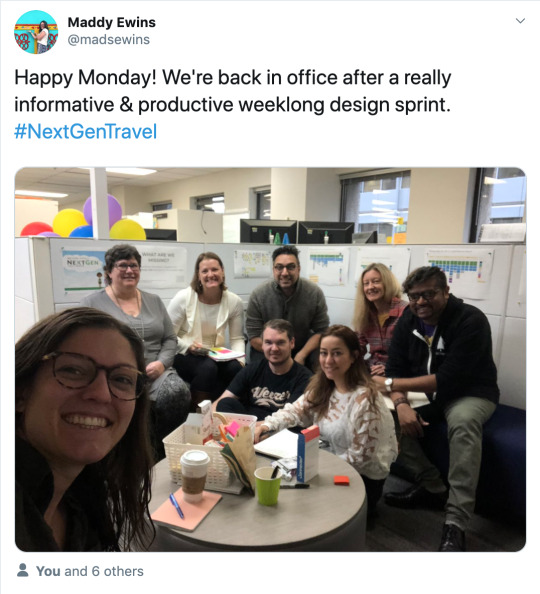
Tuesday
Tuesday officially kicked off the FWD50 conference here in Ottawa.
According to the organizers, FWD50 is “more than an event. It’s a conversation between public and private sector about what we can be when we steer progress towards our better selves.” This three-day event featured a variety of speakers talking about digital transformation, particularly in the public sector.
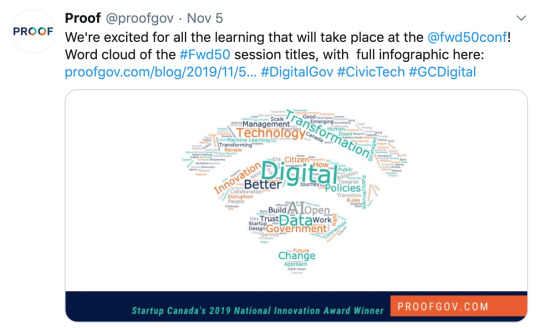
A sampling of Tuesday sessions topics included:
Governing From The Edges: Digital Change, Inclusion And Impact In British Columbia
The Good, The Bad And The Ugly Of Government Of Canada Innovation Work
Technology, Trust And Talent For The Digital Age
Exploring Next Generation Citizen Experience
But for all the innovators onstage at Aberdeen Pavilion, we were most excited about what was queued up that evening at the Orange Art Gallery. Three of the four current Code for Canada cohorts presented project updates at a loosely-affiliated offsite Open House.
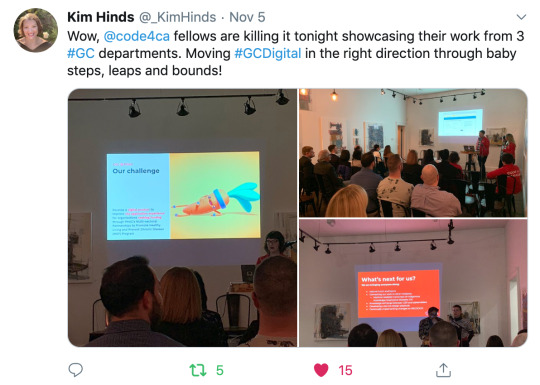
Working on the relatively short presentation (10ish minutes) was a great exercise for the team. What did we want to leave the audience with? We reflected on some of the powerful presentations we’d seen in the past, and tried to bring the audience on a journey (and not just b/c our challenge is travel-related). Giving presentations can sometimes be daunting, but this was a great opportunity to talk about our work in a safe, supportive environment. As we talked of some of the existing challenges travellers face, there were so many nodding faces in the crowd! It was a great reminder that the work we’re doing can really impact people’s abilities to do their work.
Also, Mike decided to step up our presentation style with coordinated t-shirts, which were a big hit! More than one person asked us where they were from, so if this whole tech thing doesn’t work out post-fellowship, we may have a new business idea to pursue 😎

Wednesday
With Tuesday night’s presentation behind us, we were able to settle in and focus a bit more on the conference itself.
The day kicked off with CDS’ Aaron Snow talking about The Art of the Possible. I basically retweeted the entire presentation :-) Later we got a chance to sit in on David Eaves’ session about Digital Transformation Strategies from across the world. As part of our Code for Canada onboarding, we’d had the chance to spend a day with David, so we were familiar with his rapid-fire presentation style. I still think I only really comprehend a portion of his material, but it keeps me thinking for a long time after.
I was really inspired by the presentations by Shu Yang Lin about the civic tech community in Taiwan, and blogged more extensively about it over on my medium blog: What can we learn from the civic tech community in Taiwan about public discourse and engagement?
Some of Wednesday’s great sessions included:
The PIA Review
Prototyping Future Democracy
Open Data For Justice: Tracking Down NYC's Worst Slumlords
Policy Making For Nobody
Digital Transformation Strategies from Around the World
Thursday
Things were a bit slower on Thursday morning for some of us. After the Code for Canada-hosted breakfast meetup, we gaggle of fellows and Code for Canada staff gathered and chatted on some of the comfortable couches around the space.
This was definitely the type of conference where you could see folks who didn’t attend any of the informational sessions, and just used the time to connect with other government innovators. Our track jackets made us noticeable in the crowd, and let us finally connect with some #GCDigital folks we only know off Twitter. (Hi Rob!)
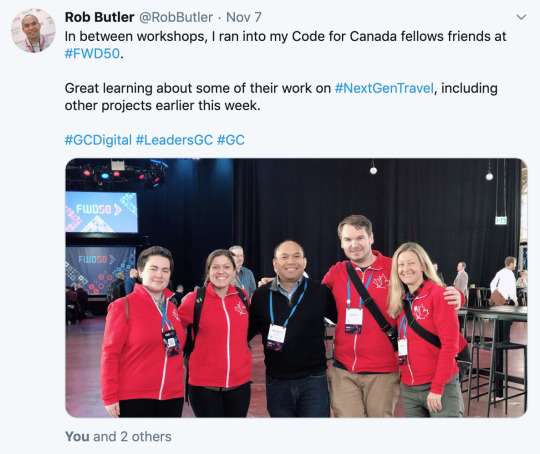
A few of the sessions I managed to jump into were Failing FWD: Lessons In Building Digital Teams And Products with the Ontario Digital service team, and Digital Disruption: Fundamentals, Business, & Execution with CIOs from three departments within the federal government.
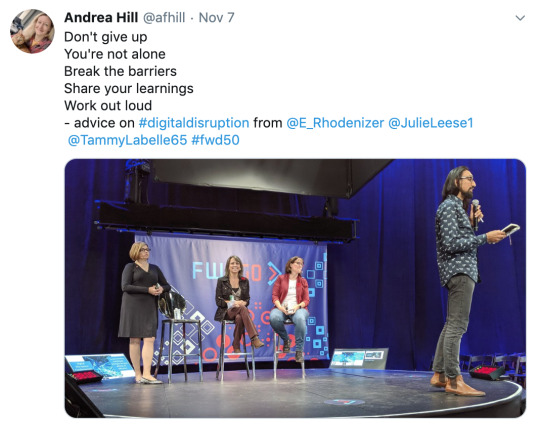
The MC for this session was Sagar from Code for Canada, and he pointed out that each of the three departments (PSC, PSPC and TC) have each hosted fellowship teams in the past. Coincidence?
The CIO session was pretty interesting, to see the leaders of these different departments at different stages along the journey. It was a nice wrap-up and reminder of the week: there’s a lot of ‘best practices’ being circulated and shared, but the gap between theory and practice can be huge.
Friday
Even though FWD50 officially wrapped up on Thursday, we managed to wrangle an invite to a “Rules as Code” working group session at the Canada School of Public Service. The speaker, Pia Andrews, participated in many sessions throughout the conference, and this was a relatively smaller audience as she went over some high-level topics and then answered open questions. Mike happened to pick the seat immediately next to Pia, and then the two Aussies chatted a bit after the session was over. Mike told her that he’d connected with the Code for Australia team that’d worked on Rules as Code, and it turns out it had been Pia who’d brought that team in. I suppose it is a small world! (Mike wrote about Rules as Code a few months ago)

Then in the afternoon we fellows congregated for a retro and offsite. It’s been a busy few weeks, and we wanted to recalibrate on how we were feeling about our team and our project. We really do get along well, and I value my teammates. It’s somewhat hard to believe that we’ve known each other for less than 6 months. There is a lot of mutual respect and care. I consider myself very fortunate to have Mike and Maddy on my team ❤️
3 notes
·
View notes
Text
Email login and other features
We’ve been working hard to make Swap My Vote as powerful as possible and have some exciting news for you!
Email login
We have built the feature most requested by you! Now that we have mandatory mobile phone verification we felt we could now to introduce this. It’s been a massive effort on the part of our incredibly talented developer volunteers.
Please let everyone know about this, as we think this could be the biggest way for use to reach and help the next untapped group of voters who want to make their votes count!
Improvements to swap options
We're responding to what you and our community of vote swappers have asked for - we've started to make sure that some of the more marginal swaps available for your voting preferences are offered, rather than a random selection.
We're aware that this might make it harder for some in safe seats to get a swap, but we also think it will help you have more electoral impact and for the Parliament to be more representative of your wishes. Please let us know any feedback on how you find this new feature!
Swap expiry time coming down!
(From 48 to 24 hours, and just 12 from tonight!)
First Past the Post is no-one's friend (well, nearly no-one) and we need to help as many people find a swap as possible. So we've made proposed swaps expire sooner if they're not confirmed. Both partners should get an email reminding them to confirm, or to look for new swaps when proposed swaps expire.
And lots of other small things that hopefully improves the voter experience!
Between them I think these improvements could help us accelerate even more in terms of impact this election.
We are aware of a few glitches, including a change to Facebook privacy settings that makes it hard to reach some vote swap partners. If you logged in via Facebook and haven't been in touch with your partner, please do try to contact them as they may not be able to reach you. And if you are uncomfortable not being able to reach your partner, you can still reset your preferences to find a new swap (the FAQ has more details). We also know that if you’ve put your mobile number in wrong, it is difficult to verify it. Please know that our team of volunteers is working as quickly as possible to fix these and make vote swapping as pleasurable as a vote that counts.

1 note
·
View note
Text
Celebrating wins: reflecting on the weeks of November 18-22
This week, our team is celebrating a few huge wins!
We finally presented a (beta version) of our insights report to our core team this week.
It’s currently a monster 155 page document since we had so much rich data from our deep discovery phase! Now that our analysis is complete and fully documented, we can draw from it to present to various audiences and - most importantly - use it as the basis for building out prototypes of our product!
Here’s a sneak peek at some slides, demonstrating the breadth of what’s covered in this report: a journey map that more accurately demonstrates the ways that applicants to MSP engage in the various touchpoints throughout the process; exploring the purpose behind certain steps and demonstrating where understandings are shared or divergent; and explaining how code can be used to streamline the process to be more opinionated in the way we collect data.
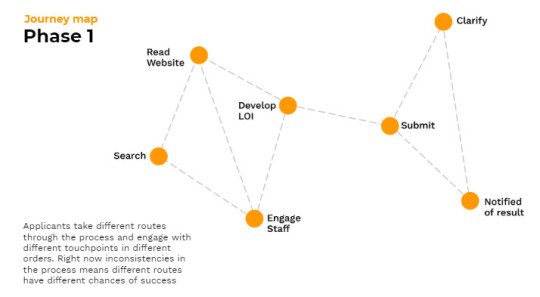
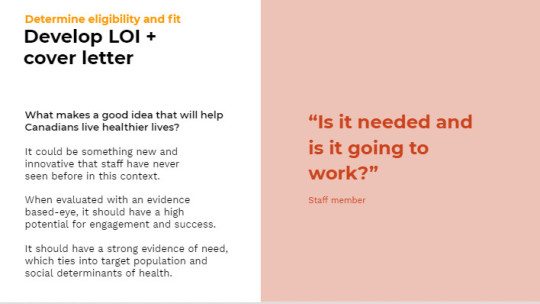
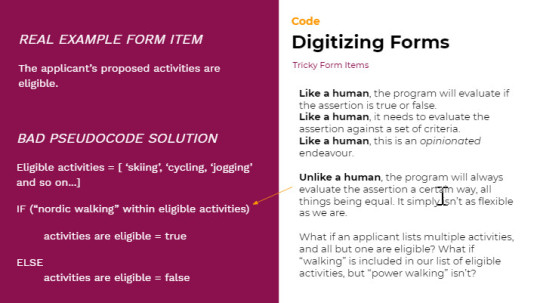
We’ll do a deeper dive into our research in another blog post soon, but for now, just know we’re pretty amped about it!
Another long-time-in-the-making milestone this week was finally getting set up for a trial instance with Apply by SurveyMonkey.
This is the Software as a Service (SaaS) solution that we’ve been leaning towards, and now we finally have an opportunity to play around with it - ie. the design, build, test part of our fellowship! We are so excited to be able to show staff more tangibly how digitization of the MSP program can improve the applicant experience, while making their own lives easier, too.
So far, Adam’s been exploring how to create different projects within it...with some existential dummy data (very On Brand for him).
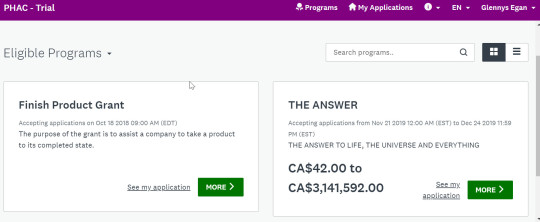
The final big milestone we hit this week was the official receipt of the Options and Analysis that had been initiated some months back by Health Canada Corporate Services in order to determine which back-end system we’d be integrating with. As you’ll know if you’ve been following our project, we are now pushing for an end-to-end solution - Apply - but it took us some time to convince Corporate Services that this was the right direction. The Options and Analysis documentation is the first step in having them support us to go in this direction and perhaps socialize SaaS solutions more broadly throughout Health Canada, when appropriate. Fingers crossed!
And, on that note, we are going to finish our big week off right by heading out for a drink together. Team building and celebrating successes are important, ya know?!
Glennys, Product Manager
#civic tech#civictech#digital government#digitalgov#product design#uxresearch#code4canada#code4all#codeforcanada#gcdigital
1 note
·
View note
Text
Working Norms: Sprint Planning
Our working style also incorporates agile sprint planning.
The first two weeks
We spent the first two weeks with our partners getting oriented, and doing free-form discovery; talking with folks, reading documents, reviewing previous research, trying to understand the problem space and organizational context, and getting situated.
We didn’t plan formal sprints; instead we created one Trello board for each week and added tasks as they emerged.
Halfway through this time, I learned about Sprint 0 from Cohort 2 #CodeForCanada PM fellow Siobhan.
Have you had any luck with Sprint 0? Is it useful?
Instead of Sprint 0, we used Sprint 1 to learn how to sprint as a team. We filled and prioritized the backlog, planned the sprint, updated and provided visibility throughout, and reviewed the sprint and did a retrospective together, continuously checking in with one another.
Although we did include substantial tasks, we were kind to ourselves if things were left incomplete.
Sprint planning schedule
Since then, we’ve been on a bi-weekly sprint schedule. The sprint schedule goes as follows:
[Ongoing] Gather activities for the backlog
[Sprint Day 1 - Monday] Sprint planning meeting
[Daily] Standup at 9:45am
[Sprint Day 10 - Friday] Sprint retro
How do you organize your sprint planning meeting, daily standup, and sprint retro meeting? When do you schedule them? What format works best for your team?
Sprint planning tools
We use Trello to build the backlog and tee-up the sprint tasks. This has a simple and straightforward Kanban format – backlog, todo, doing, done.

We tried a couple other Kanban mediums – colourful sticky notes & sharpies and writing on a whiteboard.
Although these are great for in-office visibility, ultimately Trello is our source-of-truth because it enables remote work and is accessible on mobile.
What tools or software do you use for sprint planning and tracking?
Maintaining and prioritizing the backlog
Since we’re still in discovery, our backlog tasks have been exploratory and high-level. For example, “map the policy landscape” or “build a framework to prioritize problems”.
I often refer to these as “choose-your-own-adventure” activities. In almost all cases, the person who proposed the activity was accountable for ensuring it got done. They had the best idea of how to approach the activity – whether it was individual research, a sticky-note workshop with the team, or setting up stakeholder interviews. But the approach became more visible as new information was uncovered.
Because these were mostly led by individuals, there hasn’t been much backlog maintenance or prioritization thus far.
At the beginning of a project, how do you balance your team’s excitement for individual initiatives and investigation, and prioritizing a backlog?
Looking forward
Change is inevitable. As our project progresses, we’ll reassess what works and what doesn’t, and adapt from there.
As we move into experimentation, our activities will become more concrete in scope and tasks. Our tasks will likely have to be estimated and the backlog groomed; priorities clearly communicated to ensure the team is aligned and moving in the same direction.

#WorkingStyle#WorkingInTheOpen#CodeForCanada#CodeForCA#C4C#CivicTech#GovTech#ProductManagement#Agile#Sprint#SprintPlanning#Scrum#Feedback
4 notes
·
View notes
Text
Re-imagining Canada’s energy data
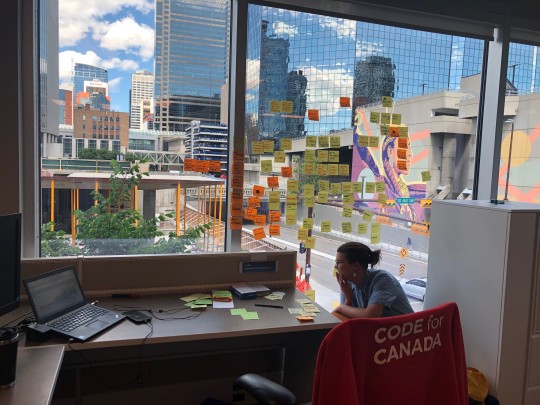
From board meetings to infinity mapping, as Code for Canada fellows, we’ve just firehosed through our first week at the National Energy Board--soon to be the Canadian Energy Regulator.
We’ve found new ways of thinking and talking about energy data. Starting with pipeline cleaners as pipeline rhumbas to gamefully engaging board members as human libraries while we assumed roles of the public--farmer, student, scientist, and more. Historically, we have viewed energy regulation as a legal experience filled with lawyers, hearings, and community groups advocating for their rights within a legal process. But many others, like the aforementioned roles, would benefit from meaningfully engaging with this information on the environment, land rights, and renewable energy that only this Board has access to.
What will this digital transformation look like? We have a plethora of ideas, but we don’t know yet. Right now we are embracing the gray area of discovery, learning from our mistakes, being mindful about our scope of work, and slowly growing our digital government skills. As we discover and navigate what’s possible in this blue sky, while refusing to let folks rain on our parade, or rather, Calgary Stampede, we’ll soon find out. We invite you to come along for the (horse) ride!
Lequanne, on behalf of the fellows
___________
Des réunions du conseil à la cartographie à l’infini, en tant que boursiers du Code pour le Canada, nous venons tout juste de briller dans notre première semaine à l’Office national de l’énergie - qui sera bientôt l’organisme canadien de réglementation de l’énergie.
Nous avons trouvé de nouvelles façons de penser et de parler des données énergétiques. Commençons par les nettoyeurs de pipelines en tant que rhumbas de pipeline, puis les membres du conseil d’administration en tant que bibliothèques humaines, tandis que nous assumons les rôles d’agriculteur public - étudiant, scientifique, etc. Historiquement, nous avons considéré la réglementation de l'énergie comme une expérience juridique remplie d'avocats, d'audiences et de groupes communautaires défendant leurs droits dans le cadre d'une procédure judiciaire. Mais beaucoup d’autres, à l’instar des rôles susmentionnés, gagneraient à s’intéresser de manière significative à ces informations sur l’environnement, les droits fonciers et les énergies renouvelables, auxquelles seul ce Conseil a accès.
À quoi ressemblera cette transformation numérique? Nous avons une pléthore d’idées, mais nous ne le savons pas encore. Pour le moment, nous abordons la zone grise de la découverte, tirons les leçons de nos erreurs, sommes conscients de notre champ de travail et développons lentement nos compétences en matière de gouvernement numérique. Au fur et à mesure que nous découvrons et naviguons dans ce ciel bleu, tout en refusant de laisser les gens pleuvoir sur notre défilé, ou plutôt dans le Stampede de Calgary, nous le saurons bientôt. Nous vous invitons à venir faire un tour à cheval!
Lequanne, au nom des boursiers
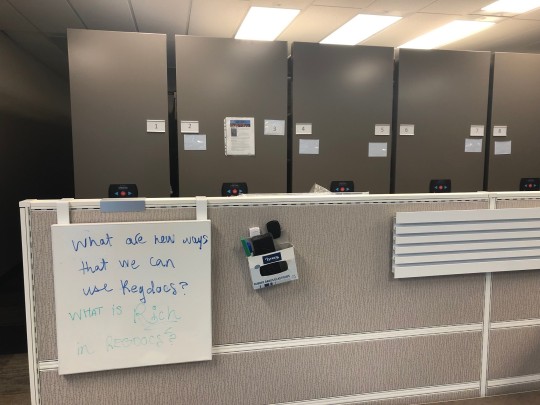
#digital government#civictech#codeforcanada#codefor#digital#energy#energy data#open data#open government#open#database ethnography#ethnography#database#open calgary#open canada#canada#canadian history
3 notes
·
View notes
Link
Why are we here, you may ask? We’re working with Public Services & Procurement Canada’s (PSPC) NextGEN Travel Program to reimagine the Government of Canada employee travel experience. Everything from approvals, to booking and expensing – to give employees more time back to serve Canadian residents.
--- Peut-être vous vous demandez pourquoi sommes-nous ici ? Nous travaillons avec le Services publics d'Approvisionnement Canada (SPAC) sur le programme de voyage prochaine génération pour réinventer l'expérience de voyager governmentale. Il s'agit des approbations, des réservations et des dépenses.
1 note
·
View note
Text
June 2019 NYTM Lineup

This month we are partnering with Civic Hall to showcase some of NYC’s best civic and social good focused tech! About Our Partner and Sponsor: Civic Hall http://civichall.org @CivicHall (https://twitter.com/CivicHall) Civic Hall is a one-of-a-kind collaboration center for the world’s civic innovators where social entrepreneurs, change-makers, government employees, hackers, academics, journalists, and artists can share knowledge, build tools, and solve problems together. This Month's Incredible Lineup: Motivote @motivoteus motivote.us Rachel Konowitz, Co-Founder + COO Motivote is the first peer-to-peer platform to use gamification, group accountability and real-life rewards to both engage and turn out young voters. Neverware @neverware www.neverware.com Forrest Smith, Director of Product Neverware is the company behind the CloudReady operating system, which enables businesses, schools, and consumers to transform existing hardware into simple, secure, and fast Chrome devices. Pluto @askPluto https://pluto.life Martin Fogelman, Founder & CEO Erica Lee, Executive VP of Growth & Strategy Pluto is an analytics platform designed for companies, built to encourage diversity and inclusivity via interactive workplace data and reporting. Quadrant 2, Inc. @quadrant2inc https://www.quadrant2.us Jason Van Anden, CEO Quadrant 2, led by "Apptivist," founder and CEO Jason Van Anden, works with a range of social justice organizations to build tech solutions which have empowered citizens and activists, non-unionized workers, victims of police misconduct, as well as immigrants facing down ICE agents. VotEd - Riverdale HS @thevotedapp www.thevotedapp.com Nolan Flynn, Will Holzman, Ben Kaufman, Ella Kay, Michael Laret, Ryan McKinney, & Jamie Schreiber; Founders VotEd is an iOS application that affords users the opportunity to make informed votes at all levels of government, by matching them with political candidates based on opinions and current events. BLOC https://www.jointhebloc.com/ Amina Yamusah, CTO BLOC is a career coaching software platform where users can access smart resume templates, save resume versions tailored to specific areas, and receive automated feedback. Pathfinder @PathfinderLabs https://www.pathfinder.vet/ Elana Duffy, Founder + CEO Pathfinder turns qualitative feedback into quantified impact for AI-powered fundraising, program growth, and connected communities. CONTAP AT OUR EVENTS In order to have the best event experience, we've teamed up with Contap Social, a networking app, to help you network with fellow attendees before, during, and after the event. We’re asking all attendees use Contap Social. Since we don’t want you to miss any of the action, we recommend you download and setup Contap Social today using the easy setup steps below. EASY SETUP STEPS 1. Download Contap Social: On your mobile phone, click this link https://contap.app.link/0abov0uOEW to download Contap Social. 2. Setup your profile: Click on the bottom right icon, and tap "edit details" to add your contact information. 3. Join the event: Return to the app's home screen, and tap on the calendar icon in the top-left corner. Then, tap on our event and enter the passcode if prompted, nytech. 4. Start networking: Tap on anyone's profile to swap socials, contact information, and documents! If you have any questions about the app, please email [email protected] or tweet at @contapsupport.
1 note
·
View note
Photo

#clubhouse #クラブハウス 【シビックテックを語ろう】 2023/03/24(金) 21:00〜23:00 コードが書けなくても参加できる! いろんな参加方法を語りましょう。 #シビックテックについて、ゆるーく、お話します。 もちろん聞き専OKで��!手上げ参加歓迎! ご参加お待ちしております! #civictech #codefor #市民協働 #市民参加 音声clubhouseは招待制を終了し、iOSとAndroidアプリで誰でも利用可能です。 https://www.instagram.com/p/CqKWRnarvj2/?igshid=NGJjMDIxMWI=
0 notes
Text
CivicTech Fellows: Voulez-vous aider à recâbler la démocratie en Afrique, en utilisant la technologie civique?
#CivicTechFellows Voulez-vs aider à recâbler la démocratie en Afrique, en utilisant la technologie civique? Venez nous aider à construire des démocraties numériques plus responsables et plus sensibles aux citoyens. @Code4Africa @CodeforAll @AfricanCIR
Code pour l’Af rique ( CfA ) est le plus grand réseau du continent démocratie numérique laboratoires, avec plus de 90 scientifiques des données à temps plein, chercheurs médico-légaux, technologues et conteurs numériques travaillant à l’appui de médias d’investigation et chien de garde CSO partenaires dans 21 pays africains. CfA construit des solutions numériques qui fournissent informations…
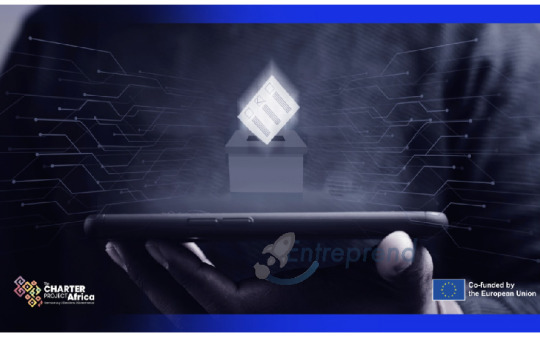
View On WordPress
#CFA#Civic Tech Fund Africa#CivicTech#CivicTech Fellows#Code pour l&039;Afrique#démocratie en Afrique#Entrepreneuriat#Opportunité#technologie civique
1 note
·
View note
Photo

Civic Tech Sweden – Civic Tech Demodag 5 okt 2021
Här är en block och en intervju om projektet av Myli – Egenmakt.
Block: https://forum.civictech.se/t/374
YouTube: https://www.youtube.com/watch?v=9YHi5sGlQkM&t=900s
1 note
·
View note
Text
10/4 (水) 第17回
本日はコンテストの応募の後と言うこともあり、結果の共有とこれからの活動の計画を練りました。
Civictech Challenge Cup(U-22)に応募したチームは、残念ながら最終選考に進むことが出来ませんでした。しかし、この大会で得た知識やフィードバックを元にこれからの活動を行っていきたいと考えています。
また、地方創生政策アイデアコンテスト2023に応募したチームはまだ結果が発表されていないため、期待しながら活動を続けていきます。


0 notes
Text
Week 2: July 2 - 5, 2019
Another four day week here in the office of Public Services and Procurement Canada working on NextGEN Travel!
The team is really looking at this problem through a *design thinking* lens, and before the Code for Canada fellows showed up, the extended team had already done a lot of work to empathize and understand government travel needs.

They’d embarked on a cross-country tour, and talked with some 750 public servants to understand their needs and expectations around a travel solution. (Man, can I admit I’d been around for some of that??!?!)


With some of the early research out of the way, it’s up to us as new members of the team to dig into what they’ve learned to work on reimagining the experience.
And ... Policy!
In addition to ramping up on user expectations and existing system conventions, we’re starting to immerse ourselves in the relevant policies related to travel. Thankfully, other members of the extended NextGEN Travel team have been able to point us to summaries and highlights of the relevant policies so we can have some awareness of the environment today. One of the other Code for Canada teams just wrote a blog post this week about relevant policies to consider related to building digital products in government. For our purposes, I’ll just list out a few of those that pertain specifically to our area of focus:
National Joint Council Travel Directive
Directive on Travel, Hospitality, Conference and Event Expenditures
Directive on Payments
Common Services Policy
Special Travel Authorities
Guide to travel, hospitality, conference, event expenditures
Guideline on Common Financial Management Business Process 3.2 - Manage Travel
.. with more to come!

Although it can be tempting to jump ahead into solving problems, we know we have a lot of possible areas to explore and improve upon.
Right now we’re still delving deep into our research and recon stage, before we shift full-force into ideation, prototyping and testing.
3 notes
·
View notes